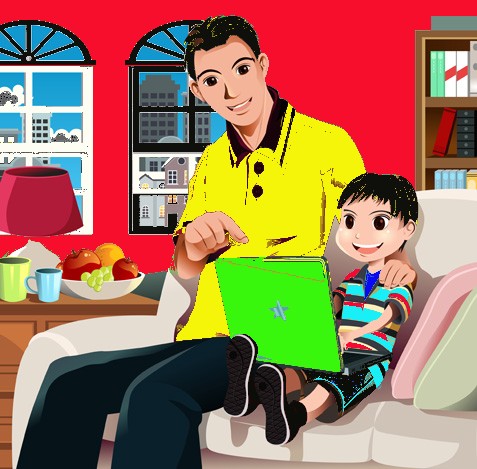The Dangers of The Internet For Children total security
The 7 main dangers children face on the Internet: how to protect them
The Internet can be dangerous for your children and adolescents.
From cyber predators to social media posts that may rise to the surface and haunt them later, the risks are worrying.
Unintentionally, children can also expose their families to the dangers of the Internet, for example by accidentally downloading malware that can allow cybercriminals to gain access to their parents'
Protecting children on the Internet is above all a matter of awareness: knowing the dangers lurking in the shadows and knowing how to protect yourself from them.
Cyber security software can protect them against some threats, but the most important thing in security is communicating with your children.
Here are the top seven risks children face on the Internet:
1. Cyber harassment
Social networks and online games are today's virtual playgrounds, which explains why we find most cases of cyberstalking there.
Or, in the case of online games, their "characters" or themselves may come under relentless attack, turning the game from an imaginative experience to a humiliating ordeal.
2. Cyber predators
Sexual predators and other predators of all kinds can stalk children on the internet, taking advantage of their innocence, abusing their trust and, perhaps, ultimately tricking them into meeting them
They can exploit the innocence of children, but also their imagination.
The FBI advises on protection from predators and other online risks to children.
However, and we stress this fact, the best protection is being able to talk with your children about what is going on in their lives.
3.Publication of private information
Children do not yet understand the concept of social boundaries.
They may post personal information on the Internet, for example on their social media profiles, which should not be visible to everyone.
It can be anything from pictures of embarrassing personal moments to their home address.
If your kids are posting in “public” mode, you can see their posts too, and there's no harm in reminding them that if Mom and Dad can see them, everyone can.
Don't snoop around, but discuss social boundaries with your kids.
4. Phishing
According to cybersecurity professionals, phishing is the use of emails to trick people into clicking malicious attachments or links.
Phishing emails and smishing texts can happen at any time, but the cybercriminals who design them monitor sites that are popular with children and collect information like email addresses and
Teach your children not to click on emails or texts sent by strangers and to beware of messages supposedly coming from their friends, but which do not contain any
5. Falling into the trap of scammers
Kids are unlikely to be fooled by Nigerian princes offering them a million dollars, but they can fall for con artists who offer them things they particularly enjoy , like
Young people are easy targets for con artists because they have not yet learned to beware.
Similar to phishing , cybercriminals can use sites popular with children to spot potential victims and then promise them something in return for what they are looking for, like
Whether it's young or old, the best protection against scammers is knowing that, if an offer sounds too good to be true, it probably isn't.
Teach your children to beware of too tempting online offers.
6. Accidental downloading of malware
Malware is computer software installed without the knowledge of the victim that performs dangerous actions on the computer.
This could be the theft of personal information from the computer or the hacking of the computer for use in a "botnet", resulting in slower performance.
Often times, cybercriminals trick people into downloading malware.
Phishing is one of them, but there are others (eg convincing victims to download a so-called game) that can be particularly appealing to children.
Like scams, your best protection is to let your kids know, although antivirus software and associated total security protections can protect your child's computer from any malicious program that stealthily infiltrates it.
In addition, many Internet safety products also include specific parental control features that allow you to securely supervise your children's Internet activities.
7. Publications that will sooner or later come back to haunt a child
Anything your child posts on the internet will be next to impossible to remove later.
But teens, in particular, don't think about the fact that a future employer (or a potential spouse) might react to "funny" pictures or other personal content that they post
on their social media profiles or on social media.
Explain to your teens that they can change the way they want to show off online, but the internet won't let them.
The Internet can be risky for children and bring wonders to them that previous generations would not have dreamed of.
Make sure your kids know the joys of the virtual world, not its dangers.




Comments
Post a Comment